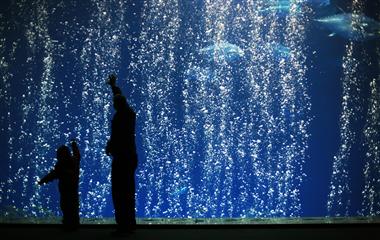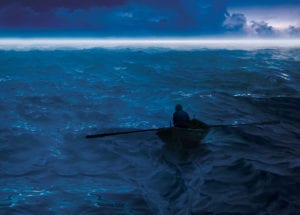From the January, 2010 issue of Orion Magazine
A Sea Change
A Film By Barbara Ettinger
Niijii Films, 2009. $24.95, 81 minutes.
In his autobiography, Charles Darwin wrote, “I was born a naturalist.” From a young age he was fascinated by every aspect of nature. In the opening scene of A Sea Change, a film directed by Barbara Ettinger, five-year-old Elias declares, “I wish I was a fish.” Like Darwin, the boy is boundlessly fascinated by nature, and his preternatural affection for the marine world makes him a passionate envoy. As it turns out, he is also the emotional center of Ettinger’s film. Elias’s joy is infectious. Whether he’s sighting his first whale from the beach or watching jellyfish gracefully rise and fall like handkerchiefs in the wind, he inspires us to love what we rarely see. Moreover, his enthusiasm inspires his grandfather, narrator Sven Huseby, to understand why the oceans are declining. Huseby, a retired teacher, serves as the film’s naïve guide; after reading an article by environmental journalist Elizabeth Kolbert on ocean acidification — sequestration of carbon dioxide by the oceans has produced extremely high concentrations of carbonic acid, threatening marine life — he launches a personal investigation into this lesser-known consequence of global warming. Ettinger and Huseby are a husband-wife team, and the film moves delightfully and easily along as they journey to the Pacific, Atlantic, and Arctic oceans, interviewing marine scientists. But they are never far from the young Elias, and Huseby’s letters home anchor the filmmakers’ quest to understand the tragedy of the oceans in relation to their love for him, and human life as a whole. The film is plaintive, but like all elegies it is willing to grieve and simultaneously move beyond grief to hope and inspiration. This is the tension that Ettinger and Huseby maintain and the reason for the film’s success. While the captivating images of ocean creatures (dime-sized pteropods that float like aquatic butterflies) deepen our attachment to the marine world, and while the sobering science (the potential for massive extinction as ocean pH levels fall) confirms our worst fears, what resonates with the viewer is the humanistic tale of a family keenly concerned about the fate of the world. — Amy L. Seidl

Sven and Elias talk about fish


